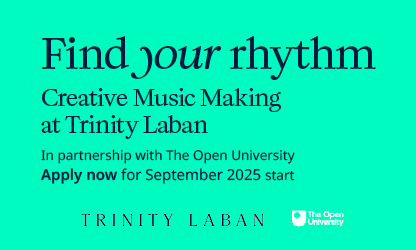Corporate member blog: The secrets of success
Dr Robin Harrison FRSA, founder of The Maestro Online, talks about the secrets of finding success on your musical path.
We all want to discover the secret to success - sure, practice makes perfect, but what does that actually mean? Can we ever achieve perfection? Is there a secret to success? Do you ever get tempted by those adverts that say, 'Seven habits that lead to success' or 'Three sure-fire ways to become a millionnaire'? Rather than being swayed by enticing marketing, let’s instead explore how real people 'practice' to become 'perfect' (whatever that is!).
Run a marathon
Beyoncé is famous for her 3.5 octave vocal range, astonishing vocal runs and dynamic dance sequences on stage - how do you even prepare for that? Famously, her dad made her run up to three miles whilst singing her album or concert sets. There’s even been a study by sportswear brand Pour Moi researching which songs enable you to shave time off your big run - allegedly Beyoncé’s are the most effective and will reduce your marathon time by up to a whopping 23 minutes!
Do nothing
Elton John enjoys controversy, but are his views on practice true? In an interview with Ultimate Guitar, he said - 'Never. When I make records or go on tour, the last thing I want to do is play the piano. I've got a piano in my house and one in Atlanta – never touched it.' So the secret to success is not to practice? Somehow that just doesn’t ring true.
Don't seek perfection - seek improvement
The Status Quo guitarist Francis Rossi has really developed his practising since he turned 40 and works on it a couple of hours per day. However, in an interview with The Guardian, he said - 'And don't worry about all that practice makes perfect rubbish - whoever said that should be strung up - don't start waving the idea of perfection around to someone who's starting to learn an instrument because it'll put them off. Practise to get better, practise for fun, but don't practise to make perfect.'
Francis then describes improvisation as the way forward, a more organic and spontaneous approach. He sees those that read notation well, whilst being talented, as essentially learning to speak but only being able to speak by reading words off paper. I can relate to that, as a musician who learned how to play well classically and been successful but didn’t really 'lift the notes off the page' or 'live the music.' It’s only when I delved into the world of improvisation that I played my best.
Train and train and train
The obvious next step is to explore a giant of improvisation, Oscar Peterson. But despite being one of the most famous improvisers of the 20th century, much of his practice routine was the exact opposite! In his piano studies, he learned famous classical technical methods such as scales, Hanon, Czerny and Dohnanyi and practised them for hours per day. He is said to have practiced from breakfast to lunch, lunch to dinner and dinner to bed, some say up to 18 hours on his longest days. Then, he adapts this practice regime and ensures that both hands can play every lick, or maintains one hand in time and lets the other have more elastic freedom.
Take the wrong path
Hilariously, for some, it seems to be that going the wrong direction in life is what turns you around. You become addicted to whatever your weakness is, you make choices that only put your own ego or hedonistic desires first - then you crash and burn. Once your face hits the bathroom floor, meet God on the way down, and then have an epiphany, you turn it around. This is exactly what happened to Mama Jan, vocal coach to Justin Bieber, Drake and many other huge names. Do we need to cruise for a bruise to make us realise the next step in our life journey?
Center the soul
Sting is famous for his physique and yoga-centred approach to life alongside swimming, running and walking. However, is this the Sting of today rather than what led to his initial fame? It was more than his nickname for wearing a black and yellow striped jumper that made him famous. Perhaps the most significant attribute of most legends is their ability to listen. What did Sting do? Taught himself Spanish guitar as a child and played along with 78 records. His ear came first.
So what is the secret of success? I supposed it's all up to you in the end.
Find out more about services The Maestro Online provides in our resource.
Check out The Maestro Online's website and follow them on X (Twitter) / Facebook.



